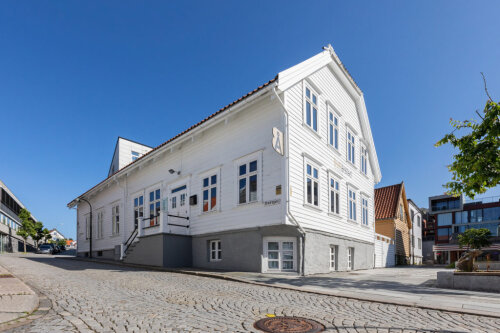Best Public-Private Partnerships (PPP) Lawyers in Norway
Share your needs with us, get contacted by law firms.
Free. Takes 2 min.
Or refine your search by selecting a city:
List of the best lawyers in Norway
About Public-Private Partnerships (PPP) Law in Norway
Public-Private Partnerships, commonly referred to as PPP, are collaborative agreements between government authorities and private sector entities for the purpose of financing, building, and operating projects that traditionally have been provided by the public sector. In Norway, PPPs have become an increasingly popular model for delivering essential infrastructure and public services, including transport, education, healthcare, and energy projects. The Norwegian government encourages PPPs as a way to leverage private investment, expertise, and efficiency, while ensuring that critical infrastructure is developed and maintained for the benefit of society.
Why You May Need a Lawyer
Engaging in a PPP project involves navigating a range of complex legal, regulatory, and financial issues. You may need a lawyer when:
- You are a private company considering bidding for a PPP contract with a Norwegian public authority.
- You are a government body seeking to structure a fair and transparent procurement process for a PPP project.
- You need advice on compliance with Norwegian and EU public procurement rules.
- Contract negotiations become complex, especially regarding risk allocation, performance requirements, and dispute resolution.
- You encounter regulatory or approval challenges from Norwegian authorities.
- There is a dispute regarding PPP contract performance, payments, or termination.
- You wish to understand tax implications, financing arrangements, or insolvency risks associated with PPP projects.
A qualified lawyer can help protect your interests, ensure compliance with local laws, and facilitate successful project implementation.
Local Laws Overview
PPP projects in Norway are governed by a combination of local laws, regulations, and guidelines, including adherence to EU directives. Key aspects include:
- Public Procurement Laws: Norwegian procurement rules are heavily influenced by EU regulations, especially the EU Procurement Directive, which sets out fundamental rules to ensure transparency, competition, and equal treatment in bidding for public contracts.
- Contract Law: Norwegian contract law, based on the Contracts Act of 1918 and subsequent case law, governs the drafting, enforcement, and interpretation of PPP agreements.
- Sector-Specific Regulations: For PPPs in sectors like transportation or energy, additional sectoral regulations may apply. These can address licensing, safety, environmental, and technical standards.
- Financing and Taxation: Norwegian tax laws and financial regulations impact the structuring and viability of PPP projects, particularly with regards to VAT, company taxation, and state guarantees.
- Dispute Resolution: Disputes in PPP projects may be resolved through negotiation, mediation, arbitration, or Norwegian courts, depending on the contract terms.
Norway’s legal framework is designed to ensure that public interests are protected while fostering efficient collaboration with private partners.
Frequently Asked Questions
What are the main types of PPP models used in Norway?
The most common PPP models in Norway include Design-Build-Finance-Operate-Maintain (DBFOM), Build-Operate-Transfer (BOT), and other concession-based arrangements, with the private partner typically responsible for construction, financing, and sometimes operation and maintenance.
Do I have to be a Norwegian company to participate in a PPP?
No, foreign companies can participate in Norwegian PPP projects, but they must comply with local procurement law and may need to form a Norwegian subsidiary or joint venture subject to project requirements.
What sectors in Norway most often use PPP?
PPP is most frequently used in infrastructure sectors such as roads, railways, schools, hospitals, and renewable energy projects.
How are risks typically allocated in Norwegian PPP contracts?
Risks are generally allocated to the party best able to manage them. For example, construction risk may fall on the private partner, while regulatory risk often remains with the public authority. Risk allocation is specifically set out in contract negotiations.
What are the main legal challenges in Norwegian PPP projects?
Challenges include complex procurement and contract requirements, regulatory compliance, risk allocation, securing financing, and managing long-term performance obligations.
Are PPP contracts subject to public disclosure?
PPP contracts are generally subject to public procurement and transparency rules. However, some commercially sensitive information may be exempt from disclosure under Norwegian law.
What happens if there is a dispute in a PPP project?
Disputes are handled according to the contract, which may provide for negotiation, mediation, arbitration, or court proceedings in Norway.
Is government support or guarantees common in Norwegian PPPs?
Depending on the project, the government may provide guarantees or other support to ensure bankability, but these are assessed on a case-by-case basis.
What environmental or social requirements apply to PPP projects?
Norwegian and EU regulations impose strict environmental and social requirements, especially for major infrastructure projects. Environmental impact assessments and stakeholder consultations may be required.
What is the typical length of a PPP contract in Norway?
PPP contracts usually last between 15 and 30 years, depending on the type and scale of the project.
Additional Resources
If you need more information or guidance, the following resources can be useful:
- The Norwegian Ministry of Transport - for transportation infrastructure PPPs
- The Norwegian Ministry of Local Government and Regional Development
- The Norwegian Public Roads Administration (Statens vegvesen)
- The Norwegian Association of Local and Regional Authorities (KS)
- The Norwegian Ministry of Finance - for financial and tax matters
- DIFI (Agency for Public Management and eGovernment) - public procurement guidance
- The European PPP Expertise Centre (EPEC) - for best practices and case studies involving Norway
- Local chambers of commerce and business associations for networking and partner searches
Next Steps
If you are considering involvement in a PPP project in Norway or require legal guidance, consider the following steps:
- Clearly define your objectives and expectations regarding the PPP project.
- Gather all relevant documentation including project proposals, contracts, and correspondence with authorities.
- Identify whether you require assistance with procurement, contract drafting, negotiation, compliance, or dispute resolution.
- Consult with a Norwegian lawyer or law firm experienced in public procurement and infrastructure projects.
- Prepare a list of questions and concerns to address during your initial consultation.
- Stay informed about relevant regulations and any potential legal changes that could impact your project.
Early legal involvement can help prevent problems and increase the chances of a successful PPP partnership in Norway.
Lawzana helps you find the best lawyers and law firms in Norway through a curated and pre-screened list of qualified legal professionals. Our platform offers rankings and detailed profiles of attorneys and law firms, allowing you to compare based on practice areas, including Public-Private Partnerships (PPP), experience, and client feedback.
Each profile includes a description of the firm's areas of practice, client reviews, team members and partners, year of establishment, spoken languages, office locations, contact information, social media presence, and any published articles or resources. Most firms on our platform speak English and are experienced in both local and international legal matters.
Get a quote from top-rated law firms in Norway — quickly, securely, and without unnecessary hassle.
Disclaimer:
The information provided on this page is for general informational purposes only and does not constitute legal advice. While we strive to ensure the accuracy and relevance of the content, legal information may change over time, and interpretations of the law can vary. You should always consult with a qualified legal professional for advice specific to your situation.
We disclaim all liability for actions taken or not taken based on the content of this page. If you believe any information is incorrect or outdated, please contact us, and we will review and update it where appropriate.
Browse public-private partnerships (ppp) law firms by city in Norway
Refine your search by selecting a city.

















